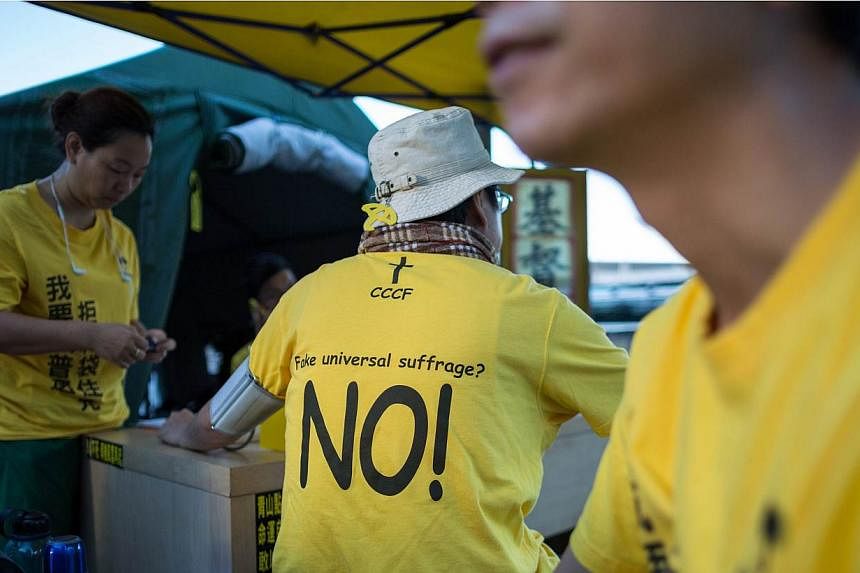Hong Kong's Legislative Council (LegCo) will this week debate and vote on a bill on electoral reforms that brought thousands of pro-democracy protesters into the streets last year.
Critics have mocked the reforms as "fake democracy" and demanded more democracy for Hong Kong, but the central government in Beijing has shown no sign of yielding to the demand.
Here's what you should know about the controversial plan:
What is in the plan?
Hong Kong returned to Chinese rule on July 1, 1997 under the "one country, two systems" principle, which states that the city would enjoy a high degree of autonomy for 50 years except in foreign and defence affairs. As a result, Hong Kong has its own legal system, and rights including freedom of assembly and free speech are protected.
Its leader, the chief executive, is currently elected by a 1,200-member election committee in which a majority of the members are seen as pro-Beijing. But Hong Kong's mini-constitution, the Basic Law, states that the ultimate aim is to elect the chief executive by universal suffrage and China has promised direct elections for the chief executive in 2017.
But in August 2014, Beijing passed a resolution stating that there must be a broadly representative nominating committee to vet contenders for the election in 2017. It said the panel's composition and size must match those of the election committee that now picks the chief executive.
What's the reaction to the plan?
- Critics say the plan makes a sham of universal suffrage, which had been promised to Hong Kong as an eventual goal. The Chinese ruling in August sparked mass protests in Hong Kong, dubbed the Umbrella Movement, that lasted almost three months. Protesters camped out along main roads in central Hong Kong and clashed with police, blocking traffic as well as affecting businesses and tourism. At the height of the protests, tens of thousands of people turned up at rallies calling for full democracy for Hong Kong.
- Pro-democracy activists have planned a series of rallies this week to pile pressure on the lawmakers debating and voting on the bill. In the first of the rallies on Sunday (June 14), more than three thousand people marched to the government headquarters, according to police estimates. One recent joint university poll showed that those against the electoral reforms took the lead for the first time with 43 per cent, versus 41.7 in support.
- The rising tension has also resulted in a new front of radical activism in Hong Kong, where some groups have staged small but disruptive protests targeting mainland Chinese visitors. On Monday (June 15), police arrested 10 people suspected of making explosives in a plot they said was linked to a radical political group. Local media identified the radical group as the National Independent Party and linked it to a new "localist" pro-democracy movement which is seeking a more independent Hong Kong.
The police seized chemicals at an abandoned television studio in the eastern district of Sai Kung, with some detonated at the scene. A house search also led to the seizure of materials which police said could be used to make the powerful explosive TATP. Maps of central districts of Hong Kong were found, as well as a number of air rifles and face masks.
What's the response from the government?
- The central government in Beijing has shown no sign of yielding to the protesters' demands. Three top Beijing officials overseeing Hong Kong affairs told legislators last month that their "principles and bottom lines are unwavering." That includes the requirement that voters could only choose from among two or three candidates approved by the nominating committee.
On the eve of the Legco debate, Mr Song Ruan, deputy commissioner of China's Ministry of Foreign Affairs in Hong Kong, said the city faces a "very worrying" future should lawmakers fail to pass the bill. Political wrangling would continue and further polarise the city, he added.
- As for the Hong Kong government, it is spending HK$5 million (S$869,000) on public meetings, television advertisements and posters blanketing trains and buses to win support for the plan. "The position has been made extremely clear by the central authorities as well as the Hong Kong government," said Ms Carrie Lam, the number two official in the Hong Kong government. "I don't think there is any last-minute concession that could be made."
What is needed to pass the bill?
The bill requires two-thirds of the 70-seat house, or 47 votes, to pass.
What is the possible outcome?
If pro-democracy lawmakers succeed in blocking the bill, the chief executive would continue to be chosen by a committee of 1,200 people, rather than by voters directly.
If the bill passes, it may incite demonstrations and unrest in the streets, as the original ruling did last year, political analysts say.
To prepare for possible trouble, thousands of police officers will be deployed during the electoral bill vote to prevent any new occupation, and they will be prepared to use tear gas and pepper spray if any demonstrations turn violent, the South China Morning Post reported earlier this month, citing unidentified police officers.
SOURCE: AFP, REUTERS, BLOOMBERG

